| Article ID | Journal | Published Year | Pages | File Type |
|---|---|---|---|---|
| 7154439 | Communications in Nonlinear Science and Numerical Simulation | 2018 | 32 Pages |
Abstract
In this paper, we study the bifurcation and chaos phenomena of technology transfer and capital transfer in global climate negotiations. We treat the climate negotiation process as a complex network, where countries participate in climate negotiations by playing a Stackelberg game. To model the system, we build a dynamic game model under the assumption that an agent country is boundedly rational. Based on the model, we give the optimal solutions for the two reduction networks. Finally, we analyze the complex dynamic phenomena of the optimal solution and discuss the influence of the parameters (e.g., the neighbors N(i)) on the complex nonlinear dynamic behavior of the optimal solution. Furthermore, we conclude that under the same conditions, the bifurcation phenomenon is more likely to occur in the capital-based network. The conclusion of this paper offers a valuable reference for climate policy makers.
Related Topics
Physical Sciences and Engineering
Engineering
Mechanical Engineering
Authors
Weidong Chen, Liming Li,
